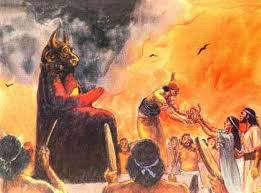A Message Concerning Ammon
49: 1-6
A message concerning Ammon DIG: Where is Ammon? And Gad? How are Judah, Moab and Ammon related? Who is Molech (Second Kings 23:13-14)? What was the source of Ammon’s false sense of security? Why do the Ammonites trust Molech? What did the LORD promise to the Ammonites when their punishment was complete?
REFLECT: How do you feel about the Ammonites being restored and given a place in the Messianic Kingdom? Does it seem fair that a people who have opposed the Jews for centuries and centuries should be saved at the last minute (Matthew 19:16 to 20:16; Mark 10:17-31; Luke 18-30)?
Sometime between 604 and 601 BC
during the eleven-year reign of Jehoiakim

The Ammonites, like the Moabites, were the product of Lot’s incestuous encounter with one of his daughters (see the commentary on Genesis Fb – Let’s Get Our Father to Drink Wine, and then Lie With Him to Preserve Our Family Line). They were located east of the Jordan River and north of Moab. Isra’el’s relations with Ammon were generally unfriendly. The Ammonites were excluded from the congregation of the LORD to the tenth generation because they joined with the Moabites in retaining Balaam to curse Isra’el (Deuteronomy 23:3-6). Relationships with the Hebrews were frequently hostile (Judges 3:13, 10:6, 9 and 18). David’s soldiers once captured the capital city of Rabbah (Second Samuel). During the reign of Jehoshaphat, the Ammonites and others invaded Judah (Second Chronicles 20:1-30). They and others tormented Jehoiakim (Second Kings 24:2). And after the fall of Jerusalem, her king was active in the effort to destroy Gedaliah’s fledgling government (to see link click Gg – Gedaliah Assassinated). Her principal deity was Molech seen above (First Kings 11:7 and 33), but from time to time Ammon worshiped the Moabite god Chemosh (Judges 11:24). Other prophets denounced the Ammonites (Ezeki’el 21:20, 25:1-7; Amos 1:13-15; Zephaniah 2:8-11).221
Concerning Ammon: This is what ADONAI-Tzva’ot, the God of Isra’el says: Has Isra’el no sons? Has she no heirs? The sin of the Ammonites was the possession of Jewish territory. If this were true it would be proper for the Ammonites to take over Jewish territory. When the northern kingdom of Isra’el was defeated by Assyria in 722 BC, the Ammonites assumed Isra’el had no heirs who would return to the land. So the Ammonites seized the territory that had belonged to Gad for herself. But Isra’el did have heirs! So it was improper for Ammon to live in the territory of Gad (see the commentary on Genesis Lk – Raiders Shall Raid Gad, But He Shall Raid at Their Heels). Why then has [the king] taken possession of Gad? Why do his people live in its towns (49:1)?
But the days are coming, declares ADONAI. When Jeremiah (under the direction of the Ruach HaKodesh) uses the phrase in the days to come; the days are coming; in those days; in that day, at that time; or for the time will surely come, the context points either to the near historical future or the far eschatological future and which one should be used. This is the tenth of twenty-five times that Jeremiah uses one of these phrases. In these verses, the priest from Anathoth has a prophecy for both the near historical future and a prophecy for the far eschatological future.

But the days are coming in the far eschatological future when I will sound the battle cry against the Ammonite capital of Rabbah in modern Jordan; it will become a mound of ruins, and its surrounding villages will be set on fire during the Great Tribulation. Then Isra’el will drive out those who drove her out, says the LORD (49:2). This has to be in the far eschatological future because Isra’el never drove out the Ammonites, the Babylonians defeated them and took them into exile. The result is that just as the Ammonites had possessed Jewish land, the tribe of Gad will end up occupying their territory once again in the Kingdom. There will be a believing remnant of Ammonites who believe in the Lord (see the commentary on Revelation Fk – Gentiles in the Messianic Kingdom).
In a near historical prophecy God describes the destruction of the Ammonites by the Babylonians (Ezeki’el 21:28-32, 25:1-7; Amos 1:13-15; Zephaniah 2:8-11). Wail, O Heshbon, for Ai is destroyed! Cry out, O inhabitants of Rabbah! Put on sackcloth and mourn; rush here and there inside the walls, for Molech will go into exile just as Chemosh, the god of Moab did, together with his priests and officials. Why do you boast in your valleys, boast of your valleys so fruitful? O unfaithful (from shuwb) daughter, you trust in your riches and say, “Who will attack me”? I am bringing terror on you, says ADONAI of heaven’s angelic armies, from every side. Each of you will be driven out headlong, with no one to gather the fugitives (49:3-5 CJB). The key word is trust, Ammon had placed her faith in her own powers, powers that were inadequate when real trouble came knocking at her door.
But afterwards, I will bring back the exiles of Ammon, says ADONAI (49:6 CJB). In a far eschatological prophecy, just as God promised a restoration of the Moabites, He promises a restoration of the Ammonites. In the Messianic Kingdom there will be a nation called Ammon in a subservient position to Isra’el.



Leave A Comment